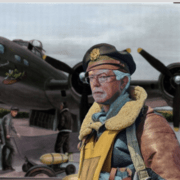|
Are you sure you're not thinking of Iwo Jima? Iwo was the only USMC battle where their casualties were higher than their opponents'
|
|
|
|

|
| # ? May 26, 2024 09:10 |
|
Even then there's an asterix as almost all of the Japanese casualties were fatalities and most of the USMC ones weren't.
|
|
|
|
MrMojok posted:Are you sure you're not thinking of Iwo Jima? Iwo was the only USMC battle where their casualties were higher than their opponents' Duh that's probably it. By recently I mean several months ago and just forgot to ask the wise thread so I must have mixed them up since Okinawa plays the much larger role in the show. So same question but for Iwo Jima!
|
|
|
|
Iwo Jima was fortified to be this crazy death trap island and marines had to land in the face of a prepared, entrenched and well designed position with Bugger all cover and then fight with gently caress-all concealment in terrain that not only favoured the defender but negated a lot of the American strengths. I only know those broad strokes really from memory, but letters from Iwo Jima (book) is a good read and well worth checking out. I'm sure someone with waaaaaayyyy more knowledge is about to chip in though!
|
|
|
|
Well, to start with, at Iwo the Japanese were able to rain mortar/artillery/rocket fire on the Marines pretty much nonstop for several days. The guns in Suribachi weren't silenced until two or three days after the landing, for example. These guns could hit all up and down the beach. And even after this the guns the Japanese had at the other end of the island, and the ones on the plateau North and East of Suribachi, continued to fire for much longer. Sifting through casualty lists in WWII is sometimes confusing, and as morbid as it is I admit I spend a lot of time doing this with regards to the USMC in the Pacific. It can be confusing because some sources list KIA and "died of wounds" separately, and sources will vary on the totals, among other things. But generally speaking, at the end of the first day of the landing on Iwo, the Marines had about 550 dead and 1800 wounded. This is roughly a third of their casualties for their entire fight at Peleliu (which took place over a period of about six weeks.) After Suribachi, still to come was the long, bitter slog to the other side of the island. Like in the Umurbrogol mountains on Peleliu, the Japanese were dug into caves; also spider holes, camouflaged blockhouses and bunkers, and the Marines just had to eat a lot of casualties for each little chunk of ground they advanced across. Even after most of the Japanese indirect fire weapons were silenced later, they still had to contend with hellish amounts of small arms fire coming from concealed locations, all the way up the island. On top of this, the Japanese commander Kuribayashi had outlawed "Banzai" charges on Iwo, as they were just too wasteful. His strategy was basically to have people hold in place, and make the USMC pay dearly for every yard advanced. That said, near the end there were a couple of banzai charges, but not nearly in the numbers and frequency that had been seen earlier in the Pacific. Fun fact: about 30% of all Marines killed in WWII died on Iwo, and about 27% of all their injuries occurred there.
|
|
|
|
Pontius Pilate posted:I had completely forgotten Trump used a Soviet (I think) soldier for some veterans related thing. You think it wouldn't be difficult to throw the country you want in front of the search. Adding in a country doesn't necessarily return the results for that country. Not that it would be too hard to click the image and read a caption, but if you're aiming for low effort, you go all the way.
|
|
|
|
How did soldiers throughout the ages carry their shields outside of battle?
|
|
|
|
SlothfulCobra posted:How did soldiers throughout the ages carry their shields outside of battle? I always assumed it was slung across their backs.
|
|
|
|
Trin Tragula posted:5 May: The Gardeners of Salonika shoot down a Zeppelin; there's a small but extremely significant change in the situation at the Battle of Verdun; Bernard Adams is a bit too eager with his snipers and gets whizz-banged for his pains; and E.S. Thompson completes his journey forward to Arusha. Nice, I didn't know about the Zeppelin shoot-down. It's notable, too that the shell exploded inside the lifting cell and the airship didn't catch fire - hydrogen is really less flammable then you'd think when not mixed with air
|
|
|
|
Deteriorata posted:I always assumed it was slung across their backs. Yeah, but how would that work, would they have a special strap just for holding their shield on their backs, or was there something else?
|
|
|
|
They would also probably toss them as luggage on whatever was handy. I'm thinking of vikings sticking their poo poo on the sides of their boats, but it's not like carts, wagons, and donkeys were unknown even among infantry. I'm guessing that much like modern forces there was a distinction between all the poo poo you hauled around as camp luggage and what you wore on the march, and the gear you carried to the fight. I would hazard a guess that the carry it/ wear it breakdown looks pretty similar to what you would see a modern infantryman doing with his body armor.
|
|
|
|
SlothfulCobra posted:How did soldiers throughout the ages carry their shields outside of battle? Depends on the shield shape/size. Shields often seem to have some kind of extra strap so you could sling it around your neck, on your back, or on your horse for travel. We know big shields, like pavises, were carried in baggage trains, which sometimes caused problems if the baggage was inaccessible (like at Crecy). Bucklers were carried on the belt, often on the same hip as the sword. You'd just hang the buckler off the sword, so that if someone attacked you, you could snatch your buckler up, then draw your sword while defending yourself.
|
|
|
|
Taerkar posted:Even then there's an asterix as almost all of the Japanese casualties were fatalities and most of the USMC ones weren't. 
|
|
|
|
But even without that potion Japanese rounds would have just bounced off him!
|
|
|
|
|
You saw what he did to the Roman legions.
|
|
|
|
Are there any resources about looting on a battlefield during and after the fighting? A friend told me to pick up Medieval Surgery by Tony Hunt but I was wondering if there was anything else like letters describing the state of the battlefield, wounded, dying, and how the loot was collected.
|
|
|
|
Cyrano4747 posted:They would also probably toss them as luggage on whatever was handy. I'm thinking of vikings sticking their poo poo on the sides of their boats, but it's not like carts, wagons, and donkeys were unknown even among infantry. I'm guessing that much like modern forces there was a distinction between all the poo poo you hauled around as camp luggage and what you wore on the march, and the gear you carried to the fight. I would hazard a guess that the carry it/ wear it breakdown looks pretty similar to what you would see a modern infantryman doing with his body armor. Roman legionaries in particular seem to have marched with their fighting kit at the ready--wearing the armor, sword and dagger on the belt, pilum and shield in hand. Possessions and gear not related to fighting (construction tools, cookware, food, etc.) was wrapped up and tied to a pole slung over the shoulder, pretty much like a hobo bindle. You can see how, if they were caught on the march, this would allow them to ready for action by just dropping the bindle and forming up. Though obviously if they were planning for a fight they would build a fortified camp and leave their poo poo there during the battle. Of course, post-Marian legions were notable for taking considerable pains to have the men carry as much as possible to minimize their baggage train, so that might not be representative.
|
|
|
Taerkar posted:You saw what he did to the Roman legions. Actually the legions he was fighting were the notorious incompetents sent to gaul specifically because they weren't wanted elsewhere. When him and obelix go to rome they're faced with ceasar's crack troops and asterix openly admits they'd be cut to pieces. I'll let myself out now.
|
|
|
|
|
bewbies posted:The art:science ratio for artillery was much, much higher then than it is now. There were big variances between guns, even of the same type, so having a gunner who knew the personality of his particular section of guns was a big help. You also had pretty significant variances in ammunition and powder which you had to account for, so making the judgment calls on adjustments was a real seat-of-pants kind of operation. They also had to operate under fire with some regularity which is a rarity for modern gunners, you can imagine how getting shot at might affect your ability to use your rangefinding widget accurately. Thanks. This raises a related question - when counterbattery fire happens, what's the intent? Is it to kill all the artillerymen? Or is it to damage the cannons? Cannons are pretty big solid pieces of metal, would they be meaningfully damaged by a direct hit from an enemy cannonball or just knocked around/off its wheels? Did field artillery guys build earthworks around their guns at all if they were concerned about counterbattery?
|
|
|
|
Pontius Pilate posted:I had completely forgotten Trump used a Soviet (I think) soldier for some veterans related thing. You think it wouldn't be difficult to throw the country you want in front of the search. While I was in the (U.S.) Navy, someone from the training division put up a banner for Veteran's Day that a WWII Luftwaffe pilot alongside a sappy remembering our troops slogan. Maybe it was some civilian contractor that made it but, I think theres decent odds that the target audience won't know the difference.
|
|
|
|
AmyL posted:Are there any resources about looting on a battlefield during and after the fighting? A friend told me to pick up Medieval Surgery by Tony Hunt but I was wondering if there was anything else like letters describing the state of the battlefield, wounded, dying, and how the loot was collected. https://books.google.de/books?id=GU...llaging&f=false
|
|
|
|
Thanqol posted:Did field artillery guys build earthworks around their guns at all if they were concerned about counterbattery?
|
|
|
|
Thank you very much!
|
|
|
|
AmyL posted:Thank you very much!
|
|
|
|
SlothfulCobra posted:How did soldiers throughout the ages carry their shields outside of battle? Shields made from glueing multiple strip of wood needed to be protected from moisture, hence you have roman soldiers carrying their shields in leather bags on the march.
|
|
|
|
Thanqol posted:Thanks. This raises a related question - when counterbattery fire happens, what's the intent? Is it to kill all the artillerymen? Or is it to damage the cannons? Cannons are pretty big solid pieces of metal, would they be meaningfully damaged by a direct hit from an enemy cannonball or just knocked around/off its wheels? It all counts if it silences the enemy battery. Damaging a gun's carriage would be meaningful damage to the whole gun if it can't handle the recoil it was designed for or if it makes it inoperable. Killing or maiming the crew or horses or hitting an ammo carriage would also help. Hitting the cannon barrel itself with solid shot would be harder to achieve and results I don't think can be generalized, depends on kinetic energy and angle of impact, is the barrel steel or bronze, effect of cosmic rays etc.
|
|
|
|
Slavvy posted:Actually the legions he was fighting were the notorious incompetents sent to gaul specifically because they weren't wanted elsewhere. When him and obelix go to rome they're faced with ceasar's crack troops and asterix openly admits they'd be cut to pieces. If you're remembering the same one I'm remembering (Asterix and the Laurel Wreath), I'm also remembering that he said that while trying to restrain Obelix from literally charging right through the front door of Caesar's palace, and it doesn't stop them later having one of those wonderful external-shots-of-a-building-while-they-beat-up-all-the-guards scenes. (I happened to re-read it the other day. It's still great.)
|
|
|
|
JaucheCharly posted:Shields made from glueing multiple strip of wood needed to be protected from moisture, hence you have roman soldiers carrying their shields in leather bags on the march. When did water-resistant glue first get invented? It seems the tendency of early glues to dissolve was often a headache.
|
|
|
|
Nenonen posted:It all counts if it silences the enemy battery. Damaging a gun's carriage would be meaningful damage to the whole gun if it can't handle the recoil it was designed for or if it makes it inoperable. Killing or maiming the crew or horses or hitting an ammo carriage would also help. There's also the soft effect that often gets discounted: having your artillery come under fire results in your artillery dudes performing worse, even if no one dies.
|
|
|
|
The Lone Badger posted:When did water-resistant glue first get invented? It seems the tendency of early glues to dissolve was often a headache. Don't know exactly. I had something on that in an article about animal glues or one of the standard works about wood, but it wasn't until very recently that these were invented. They're all the results of modern research. There's ofc old glues that are less soluble in water, but they're nowhere as strong as animal glues. Resins for example. It's not that these glues dissolve at the first contact with water, especially if the glueline is thin. It can take days for things to come apart, but damp environments and no drying will do damage. Rot and mold will set in, the glue swells and things come apart.
|
|
|
|
Cyrano4747 posted:They would also probably toss them as luggage on whatever was handy. I'm thinking of vikings sticking their poo poo on the sides of their boats, but it's not like carts, wagons, and donkeys were unknown even among infantry. I'm guessing that much like modern forces there was a distinction between all the poo poo you hauled around as camp luggage and what you wore on the march, and the gear you carried to the fight. I would hazard a guess that the carry it/ wear it breakdown looks pretty similar to what you would see a modern infantryman doing with his body armor. Vikings put their shield on the sides of their ships only when they wanted to show off when they entered harbours. Iirc hoplites' shields were so concave that they rested partially on their shoulders when they held them in their hands.
|
|
|
|
Thanqol posted:Thanks. This raises a related question - when counterbattery fire happens, what's the intent? Is it to kill all the artillerymen? Or is it to damage the cannons? Cannons are pretty big solid pieces of metal, would they be meaningfully damaged by a direct hit from an enemy cannonball or just knocked around/off its wheels? The intent is to prevent the enemy battery from firing effectively. The means don't really matter, but the most common are: 1. Making things irritating enough for the gunners that the battery is withdrawn. The people are outrageously expensive specialists and aren't worth being wasted in stupid artillery duels that aren't serving a direct, battle winning purpose. 2. Killing or injuring people and horses. The people are outrageously expensive specialists, so killing them is always good, and horses are both vital and always in short supply. 3. Damaging and dismounting the guns. A dismounted cannon is unusable in a tactical sense, since you have to rebuild a carriage of some kind. They certainly could be damaged by a direct hit from an enemy round shot, but destroying the limber was much more common. In most field engagements, there was some construction of earthworks, usually using fascines. Artillerymen also were very particular about the ground and spent a lot of time with shovels and markers and what not.
|
|
|
AmyL posted:Are there any resources about looting on a battlefield during and after the fighting? A friend told me to pick up Medieval Surgery by Tony Hunt but I was wondering if there was anything else like letters describing the state of the battlefield, wounded, dying, and how the loot was collected. Well from what I can tell you about reading from the brutal aftermath Napoleonic battles it wasn't pleasant then so I doubt there is much changes between then and now. Long story short, it wasn't nice. In this era, one of the duties of the musicians was to help collect and hurry the wounded from the field but well due to the nature of the battle and limited number of musicians marching with a regiment it would be a very long wait unless the the fight was short or it was a brief skirmish. During this time as a wounded soldier you had a few options. If you were lightly wounded you could eventually limp up together with some friends and eventually locate a place to take shelter bartering with whatever goods you could snag from the dead or on your person. If you were heavily wounded well I am sorry but you are doomed to an undignified death. But chances are you could easily join the latter if you don't get your wounds treated and get into shelter because infection will loving kill you stone dead. But during the carnage of the post battlefield your health and well being is only one of many things to worry about. You see, chances are your battle took place near somewhere vaguely civilised your factions army may have rudely interrupted the civil life of the inhabitants of that area by living off the land and garrisoning their homes while they were fleeing for not wanting to get caught in the middle of a battlefield. And now they are back, some of which have no qualms in looting from your dead enemies and comrades corpses. Or well, even while they are still alive. Don't struggle or protest now they'll loving kill you if you resist taking what little personal goods from you now! they aren't even going to be caught, your an injured dying guy in a place full of injured dying dudes. Oh, and don't think honour or chivalry or compassion will stop your own fellow soldier enemy or ally from doing the same. Soldiers are happy to join in and take their own plunder and trophies from your still warm body. Just hope he's the friendly type and not full of bitter hatred who enjoys killing as much of the enemy! Oh and don't think your teeth are safe. even if none of them are gold. Your fair game now my friend. Welcome to hell. If you were an officer or nobleman this could play out slightly differently. A retainer or fellow officer or even somebody who'd serve under you might be compassionate or mercenary enough to help you on a horse or at least watch over your injured self until help arrives or you get enough strength to hobble off the field. A fellow officer or nobleman might even happily help you during the battle and ensure you'll be at least comfortable. Once you've survived all that depending on the era, you'd be escorted to a make shift field hospital where a new hell awaits you if you have an injured limb. If you are mortally wounded with an internal wound you'd get dumped into what was called a charnal house to die with a bunch of other long suffering soldiers. As for plunder now, it depended on the scale of the stuff. Personal affects found on the more common soldiery was basically finders keepers. If you are taking serious money like baggage trains, chests full of coin for payment and looted valueables now usually seized and secured as effectively as possible by organised hands for distribition and payment to the regiment or army as a whole using a prize system. Or well, the founder of the regiment or warband could keep it for himself. It really depends on the era this happens. SeanBeansShako fucked around with this message at 14:56 on May 13, 2016 |
|
|
|
|
Larrey established the mobile ambulance, which was pretty important in terms of being able to evacuate wounded by methods other than the guys playing tunes.
|
|
|
KYOON GRIFFEY JR posted:Larrey established the mobile ambulance, which was pretty important in terms of being able to evacuate wounded by methods other than the guys playing tunes. They were fantastic and worked as well. They are fascinating to look at from an engineering and design view point too. Much better than being awkwardly crammed in a dirty old dung smeared cart on top of other dead guys. I bet they were even hosed or washed down when they could it! Such a shame there was never enough of them though  . .
|
|
|
|
|
Question about the French Revolution - as I understand it, the Revolution kicked off at least partially because France was heavily in debt and there was a famine going on. So when the revolutionaries and later Napoleon took over, what if anything did they do to resolve those problems, and were they successful? Was the debt purely resolved by plundering national banks in conquered countries? If so, what happened to the economies of those areas afterwards?
|
|
|
|
Tomn posted:Question about the French Revolution - as I understand it, the Revolution kicked off at least partially because France was heavily in debt and there was a famine going on. So when the revolutionaries and later Napoleon took over, what if anything did they do to resolve those problems, and were they successful? Was the debt purely resolved by plundering national banks in conquered countries? If so, what happened to the economies of those areas afterwards? Do you like stories about looting, confiscating Church property and [currency] being traded at [small percent] of face value?
|
|
|
|
Tomn posted:Question about the French Revolution - as I understand it, the Revolution kicked off at least partially because France was heavily in debt and there was a famine going on. So when the revolutionaries and later Napoleon took over, what if anything did they do to resolve those problems, and were they successful? Was the debt purely resolved by plundering national banks in conquered countries? If so, what happened to the economies of those areas afterwards? Well, one thing a revolutionary government can do is say 'nope! we're a new government now, the old one's debts are nothing to do with us, suck it bankers'. Especially if those bankers are a) French, and b) have just been guillotined.
|
|
|
|
feedmegin posted:Well, one thing a revolutionary government can do is say 'nope! we're a new government now, the old one's debts are nothing to do with us, suck it bankers'. OTOH people who owe you money can say "nope! you're a new government now, our debts to the old one have nothing to do with you, v/r, America".
|
|
|
|

|
| # ? May 26, 2024 09:10 |
Tomn posted:Question about the French Revolution - as I understand it, the Revolution kicked off at least partially because France was heavily in debt and there was a famine going on. So when the revolutionaries and later Napoleon took over, what if anything did they do to resolve those problems, and were they successful? Was the debt purely resolved by plundering national banks in conquered countries? If so, what happened to the economies of those areas afterwards? Basically the Revolutionary armies and Napoleon himself working for them and going solo more or less plundered and extorted a huge amount of money from their enemies via diplomacy whilst more or less telling old debts to gently caress off. After Napoleon declared himself a Consul of France he set up the incredibly successful Bank Of France which grew more successful with each one of his victories.
|
|
|
|







































